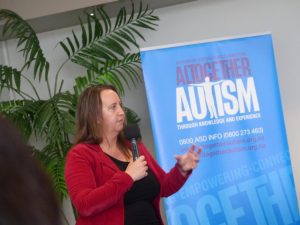16 March 2017 – Whenever new research is published, those of us with a special interest in autism check it out with equal parts of enthusiasm and caution. When the University of Auckland published new research in 2016, our national manager Catherine Trezona, asked Liliya John, one of our researchers, to investigate the findings. It seemed zinc might potentially safely support improved brain cell communication, and in the words of the new research ‘offer hope of new autism treatment.’
However, when Catherine shared the findings with Paula Jessop, member of our consumer reference group, Paula recommended caution in publishing the research report. In Issue 1 of the Altogether Autism Journal for 2017, we share both Liliya’s research report and Paula’s cautions, as we try to balance reporting potentially helpful research while guarding against making premature conclusions that might be harmful.
Paula Jessop responds to research on zinc
Paula Jessop is a member of the consumer reference group for Altogether Autism. She warns about the dangers of false hope that research in early stages gives. Paula is concerned not only by the risks to autistic people, particularly children, associated with unnecessary and unproven treatments, but also the negative effects of underlying assumptions about the need to cure autism.
Recent research about the impact of zinc is in the very early stages and does not necessarily tell us much other than zinc is somehow playing a part in autism at a gene/brain cell level – to use nonprofessional’s language. At present the research is not of practical use to autistic people or their families.

Paula Jessop
Risk of physical harm
Parents who are desperate for some cure or treatment could ignore warnings that zinc supplements can be harmful. As we already know, many parents are already putting their children on a number of supplements without any real knowledge of the potential harm in doing so in the hope that ‘anything is worth a try’.
There have already been some cases internationally of children becoming physically sick because parents were unaware that the high doses and large quantities of vitamin, mineral and ‘natural’ supplements given to children could have dangerous adverse impact on their children’s health.
Why is autism something that needs to be cured?
Talking about autism in this very general sense is also dangerous in my opinion. It is not just the language; it is the attitude or perspective underlying the language and the assumption that any new information, which might help unravel the underlying, causes of autism is good because it might lead to some form of treatment that can fix some part of autism.
We know that autism manifests differently in every individual, and is accompanied by a host of variable traits and potential co-occurring conditions. So how can it be at all useful to discuss autism in such a generalised manner?
The research could potentially be useful once more studies have been conducted and when we know more about how zinc affects specific aspects of autism. It may be the case that this gene/brain cell issue may be contributing to immunity issues or physical issues such as wound healing. It may play some part in difficulty with learning and using language, or learning disabilities in general. When the research gets to the point of being more able to clearly pin point specific issues, then it may be useful.
But, there’s also a chance that what we’ll discover is only minimally helpful. We already know, within autism communities, that there is some issue with our bodies and zinc due to our experiences of having doctors tell us our levels of zinc remain well below normal, even when we take zinc supplements to correct it.
What we also know from anecdotal evidence is that generally we don’t experience any real change to our autism if we do manage to increase the levels of zinc in our body. We do know that some people find they get sick less often and that skin wounds heal more quickly. We also suspect that whatever our problem is with zinc may well have some contribution to co-occurring physical issues we have such as high levels of autoimmune problems or tendencies to get sick more often and for longer.
With all this in mind, neither the current research nor our anecdotal stories actually tells us much more than zinc is somehow related to autism. Therefore, until such time as the connection is better understood, I think in some ways it’s irresponsible to raise false hope or risk influencing parents to give kids more supplements unnecessarily and with possibly as much risk to their health than clear potential for gain.

New research on zinc and autism is not yet of practical use to autistic people or their families, says Paula Jessop.
I believe we autistic advocates, organisations such as Altogether Autism and professionals working in the field have a moral and ethical responsibility to think more critically about the potential negative effects on autistic people of research in the very early stages, which is not yet giving us enough information for real benefit.
We need to go beyond having a rather superficial understanding of the impact of language where autism is described in such a general sense and continues to be portrayed as a condition which is so bad that every possible little thing which might treat it is good.
We need to all be asking the questions: ‘which aspects of autism actually need treating’ and ‘which aspects of autism need support’ for autistic people to thrive in the world.
Until people start thinking of autism in this way, the view that ALL of autism is bad will predominate – and that is not helpful for autistic people.
This article was first published in Altogether Autism Journal Issue 1, 2017 read the latest edition.


